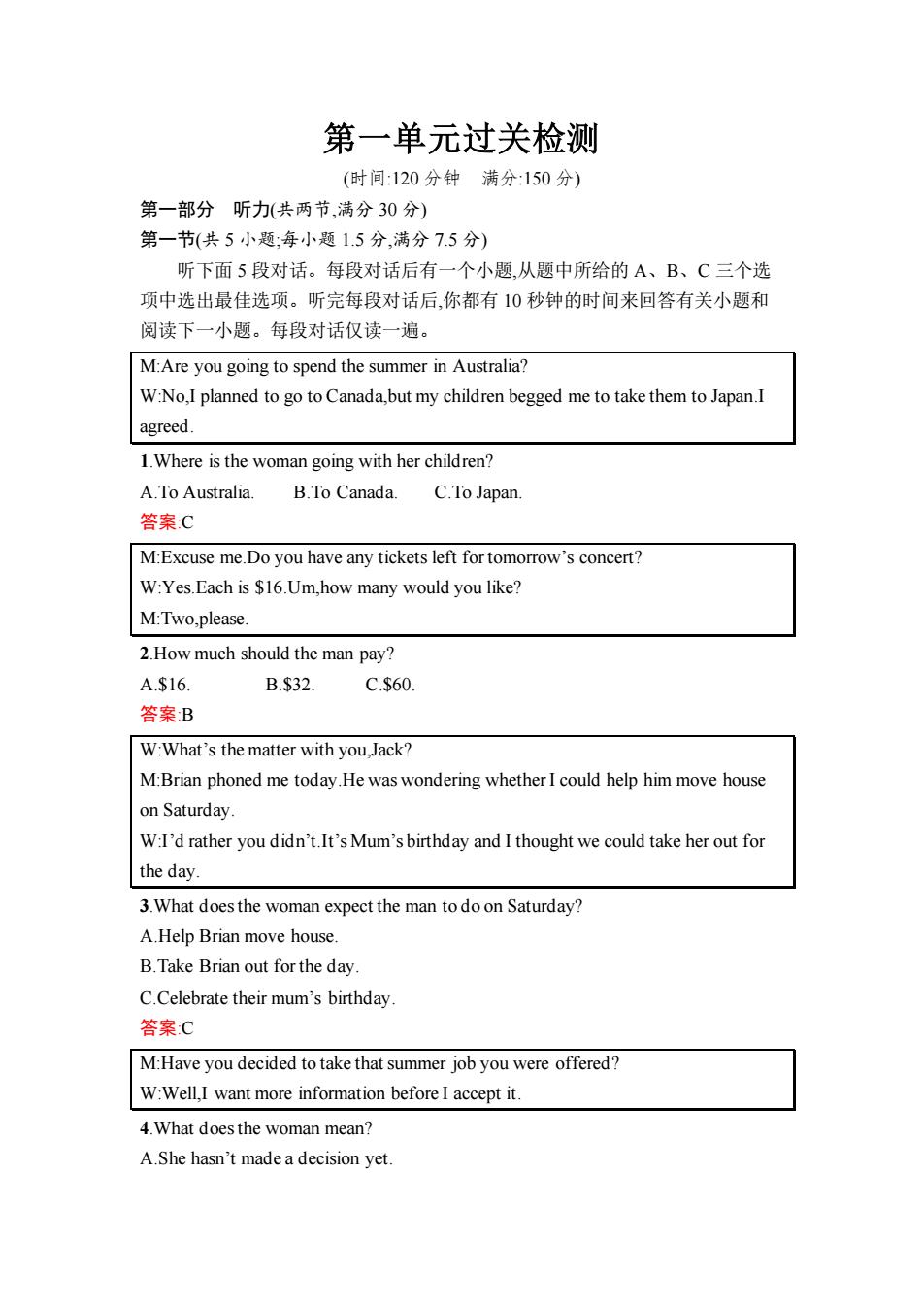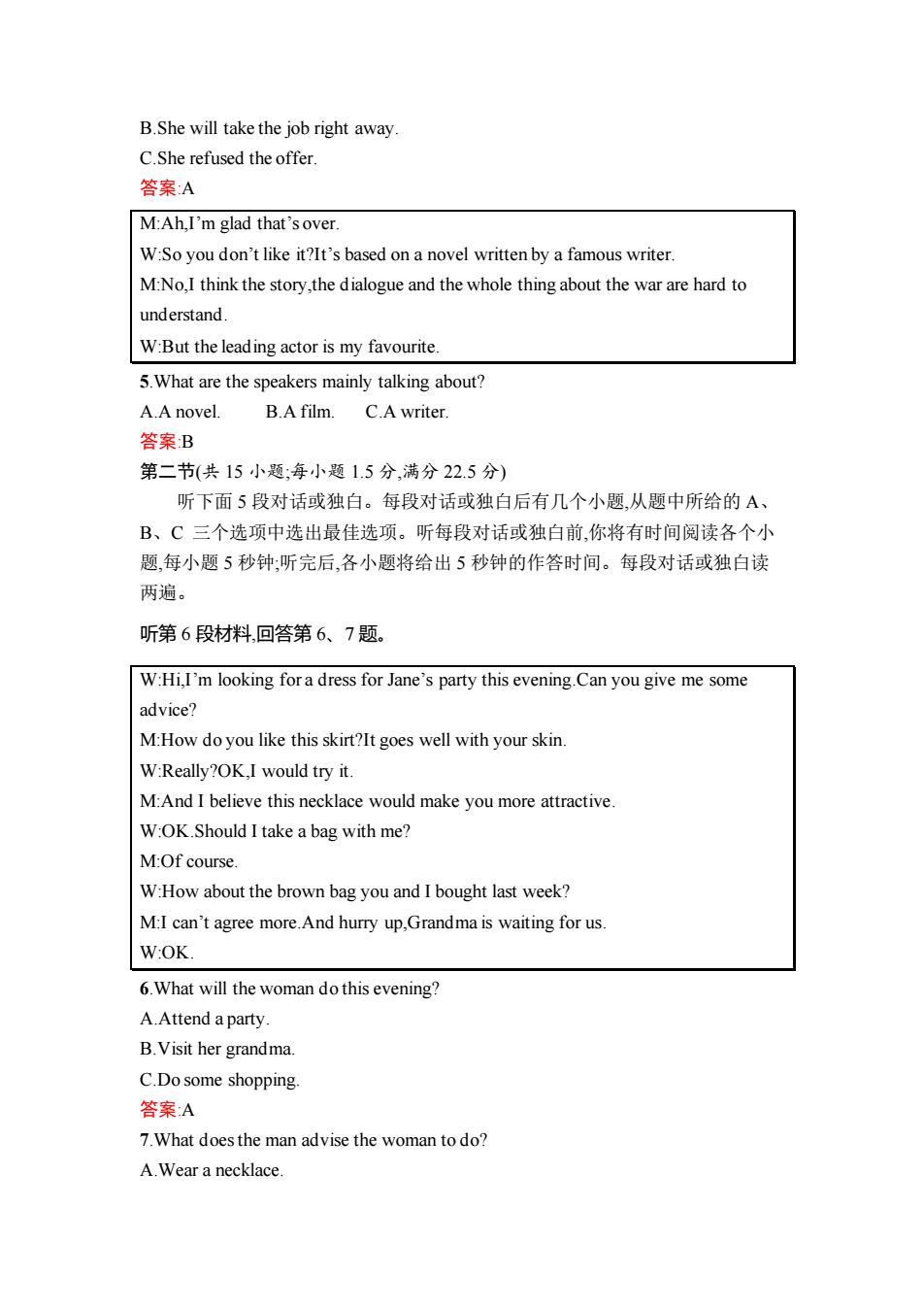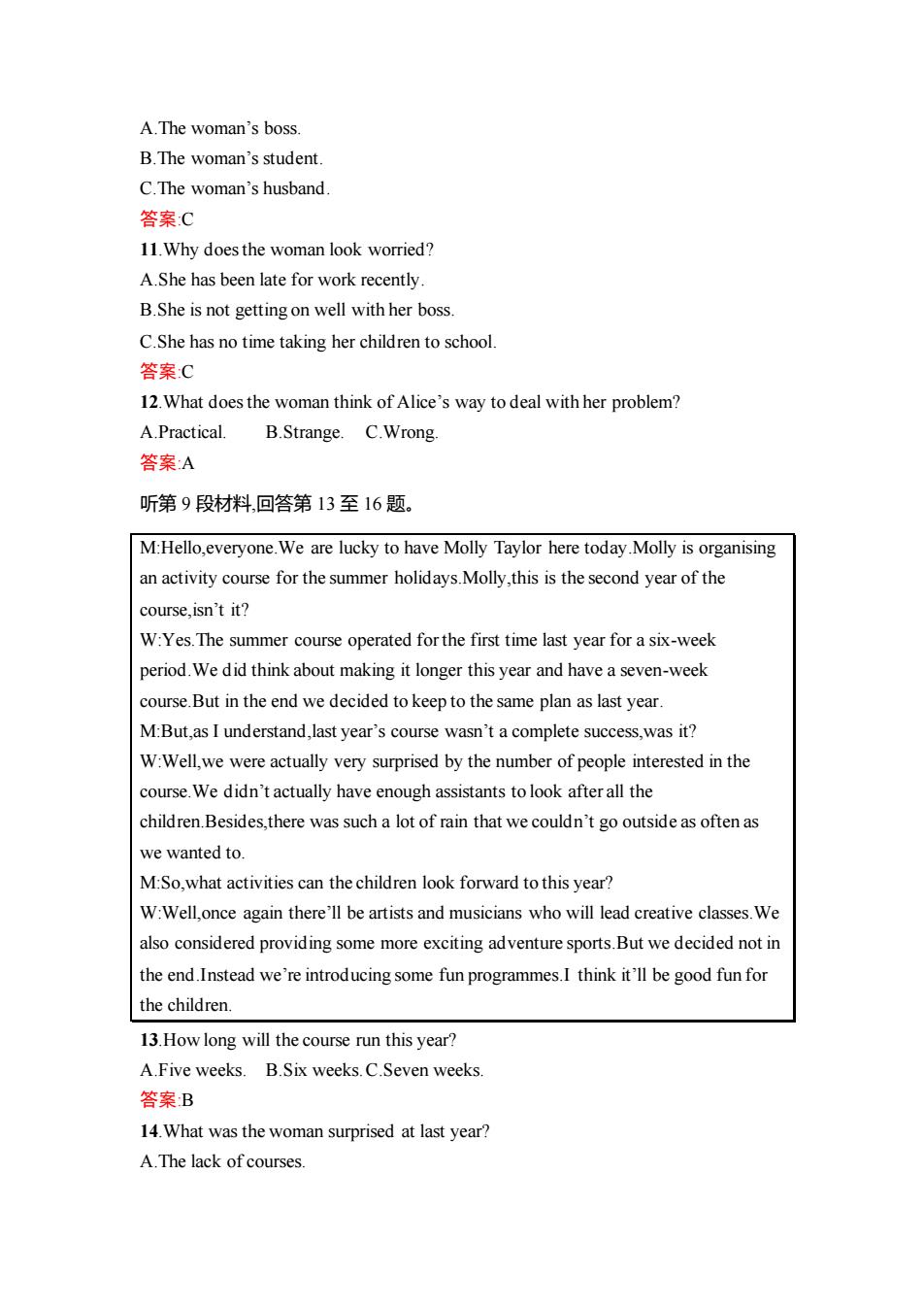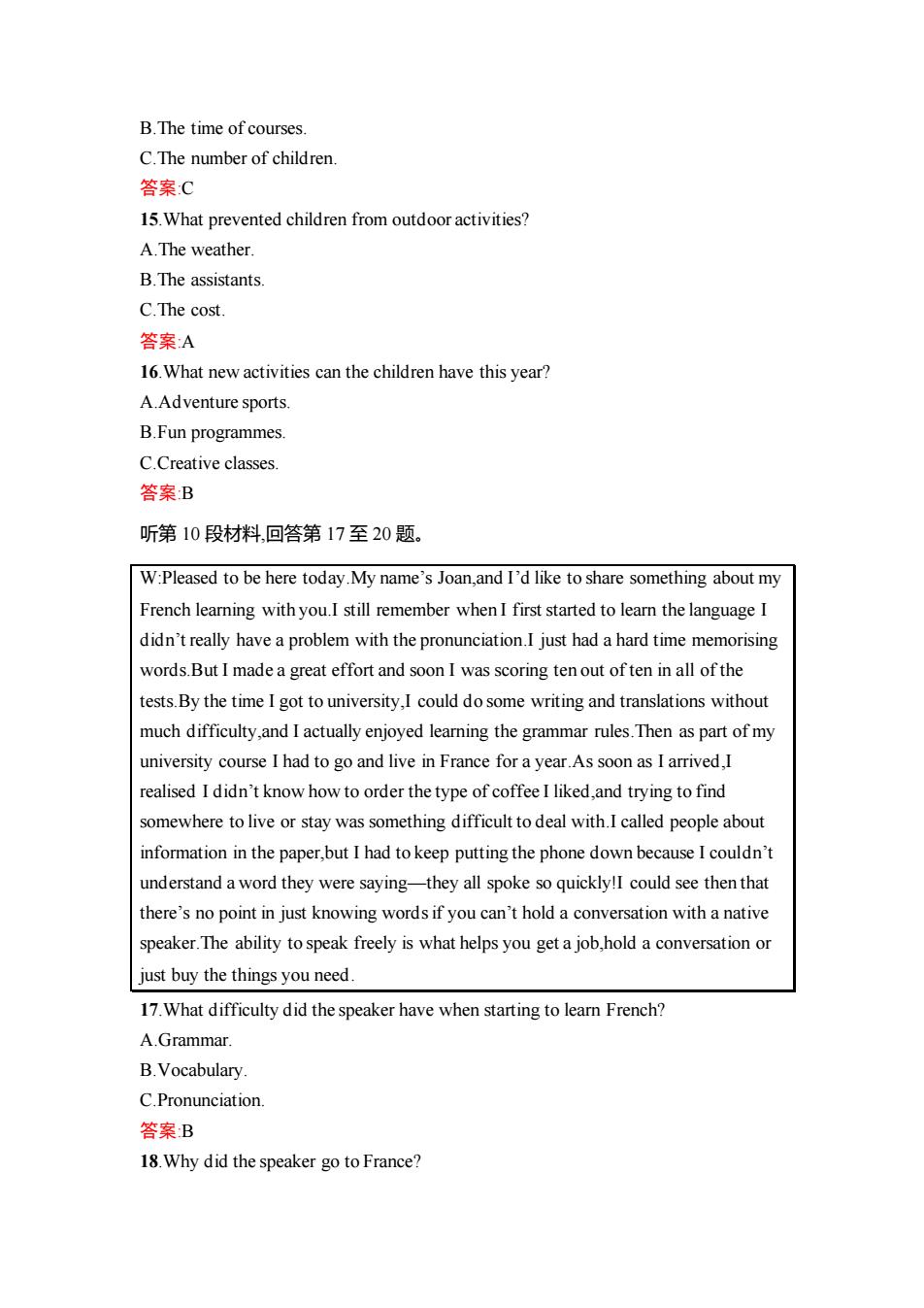
第一单元过关检测 (时间:120分钟满分:150分) 第一部分听力(共两节,满分30分) 第一节(共5小题:每小题1.5分,满分7.5分) 听下面5段对话。每段对话后有一个小题,从题中所给的A、B、C三个选 项中选出最佳选项。听完每段对话后,你都有10秒钟的时间来回答有关小题和 阅读下一小题。每段对话仅读一遍。 M:Are you going to spend the summer in Australia? W:No,I planned to go to Canada,but my children begged me to take them to Japan.I agreed. 1.Where is the woman going with her children? A.To Australia. B.To Canada.C.To Japan. 答案C M:Excuse me.Do you have any tickets left for tomorrow's concert? W:Yes.Each is $16.Um,how many would you like? M:Two,please. 2.How much should the man pay? A.$16 B.$32 C.$60. 答案B W:What's the matter with you,Jack? M:Brian phoned me today.He was wondering whether I could help him move house on Saturday. W:I'd rather you didn't.It's Mum's birthday and I thought we could take her out for the day. 3.What does the woman expect the man to do on Saturday? A.Help Brian move house. B.Take Brian out for the day C.Celebrate their mum's birthday 答案C M:Have you decided to take that summer job you were offered? W:Well,I want more information before I accept it. 4.What does the woman mean? A.She hasn't made a decision yet
第一单元过关检测 (时间:120 分钟 满分:150 分) 第一部分 听力(共两节,满分 30 分) 第一节(共 5 小题;每小题 1.5 分,满分 7.5 分) 听下面 5 段对话。每段对话后有一个小题,从题中所给的 A、B、C 三个选 项中选出最佳选项。听完每段对话后,你都有 10 秒钟的时间来回答有关小题和 阅读下一小题。每段对话仅读一遍。 M:Are you going to spend the summer in Australia? W:No,I planned to go to Canada,but my children begged me to take them to Japan.I agreed. 1.Where is the woman going with her children? A.To Australia. B.To Canada. C.To Japan. 答案:C M:Excuse me.Do you have any tickets left for tomorrow’s concert? W:Yes.Each is $16.Um,how many would you like? M:Two,please. 2.How much should the man pay? A.$16. B.$32. C.$60. 答案:B W:What’s the matter with you,Jack? M:Brian phoned me today.He was wondering whether I could help him move house on Saturday. W:I’d rather you didn’t.It’s Mum’s birthday and I thought we could take her out for the day. 3.What does the woman expect the man to do on Saturday? A.Help Brian move house. B.Take Brian out for the day. C.Celebrate their mum’s birthday. 答案:C M:Have you decided to take that summer job you were offered? W:Well,I want more information before I accept it. 4.What does the woman mean? A.She hasn’t made a decision yet

B.She will take the job right away C.She refused the offer 答案:A M:Ah,I'm glad that's over. W:So you don't like it?It's based on a novel written by a famous writer. M:No,I think the story,the dialogue and the whole thing about the war are hard to understand W:But the lead ing actor is my favourite. 5.What are the speakers mainly talking about? A.A novel. B.A film.C.A writer. 答案B 第二节(共15小题:每小题1.5分,满分22.5分) 听下面5段对话或独白。每段对话或独白后有几个小题,从题中所给的A、 B、C三个选项中选出最佳选项。听每段对话或独白前,你将有时间阅读各个小 题,每小题5秒钟:听完后,各小题将给出5秒钟的作答时间。每段对话或独白读 两遍。 听第6段材料,回答第6、7题。 W:Hi,I'm looking for a dress for Jane's party this evening.Can you give me some advice? M:How do you like this skirt?It goes well with your skin. W:Really?OK,I would try it. M:And I believe this necklace would make you more attractive. W:OK.Should I take a bag with me? M:Of course. W:How about the brown bag you and I bought last week? M:I can't agree more.And hurry up,Grandma is waiting for us. W:OK 6.What will the woman do this evening? A.Attend a party. B.Visit her grandma. C.Do some shopping 答案:A 7.What does the man advise the woman to do? A.Wear a necklace
B.She will take the job right away. C.She refused the offer. 答案:A M:Ah,I’m glad that’s over. W:So you don’t like it?It’s based on a novel written by a famous writer. M:No,I think the story,the dialogue and the whole thing about the war are hard to understand. W:But the leading actor is my favourite. 5.What are the speakers mainly talking about? A.A novel. B.A film. C.A writer. 答案:B 第二节(共 15 小题;每小题 1.5 分,满分 22.5 分) 听下面 5 段对话或独白。每段对话或独白后有几个小题,从题中所给的 A、 B、C 三个选项中选出最佳选项。听每段对话或独白前,你将有时间阅读各个小 题,每小题 5 秒钟;听完后,各小题将给出 5 秒钟的作答时间。每段对话或独白读 两遍。 听第 6 段材料,回答第 6、7 题。 W:Hi,I’m looking for a dress for Jane’s party this evening.Can you give me some advice? M:How do you like this skirt?It goes well with your skin. W:Really?OK,I would try it. M:And I believe this necklace would make you more attractive. W:OK.Should I take a bag with me? M:Of course. W:How about the brown bag you and I bought last week? M:I can’t agree more.And hurry up,Grandma is waiting for us. W:OK. 6.What will the woman do this evening? A.Attend a party. B.Visit her grandma. C.Do some shopping. 答案:A 7.What does the man advise the woman to do? A.Wear a necklace

B.Buy a new bag. C.Wait for her grandma 答案:A 听第7段材料,回答第8、9题。 W:Hi,I just arrived on Flight 245 from London.I waited until all the luggage came out,but my suitcase wasn't there M:Well,I guess it might have been put on the wrong flight.There's a chance it won't arrive until tomorrow. W:Tomorrow! M:I'm very sorry about this.Leave us a phone number so that we can reach you,and the airline will call you as soon as we get your suitcase. 8.Where does the conversation take place? A.At a hotel. B.At an airport. C.At a police station. 答案B 9.What does the man advise the woman to do? A.Wait where she is until tomorrow. B.Make a request for the loss. C.Give him her telephone number. 答案C 听第8段材料,回答第10至12题。 M:Hi,Jean.You look worried.Is everything OK? W:Well,my new boss is expecting us to start work at 8 o'clock in the morning.But I have to take our children to school.That means I'll be late for work.And you can't spare any time to do it. M:Oh,dear...er...but not a surprise.My friend Alice had a similar problem last year. W:How did she settle it? M:She didn't do anything at first.But in the end she told it to her boss.He said he hadn't realised the early start would present a problem and he agreed to let them start half an hour late. W:That's great.Perhaps I should deal with it the same way. 10.Who is the man most probably?
B.Buy a new bag. C.Wait for her grandma. 答案:A 听第 7 段材料,回答第 8、9 题。 W:Hi,I just arrived on Flight 245 from London.I waited until all the luggage came out,but my suitcase wasn’t there. M:Well,I guess it might have been put on the wrong flight.There’s a chance it won’t arrive until tomorrow. W:Tomorrow! M:I’m very sorry about this.Leave us a phone number so that we can reach you,and the airline will call you as soon as we get your suitcase. 8.Where does the conversation take place? A.At a hotel. B.At an airport. C.At a police station. 答案:B 9.What does the man advise the woman to do? A.Wait where she is until tomorrow. B.Make a request for the loss. C.Give him her telephone number. 答案:C 听第 8 段材料,回答第 10 至 12 题。 M:Hi,Jean.You look worried.Is everything OK? W:Well,my new boss is expecting us to start work at 8 o’clock in the morning.But I have to take our children to school.That means I’ll be late for work.And you can’t spare any time to do it. M:Oh,dear...er...but not a surprise.My friend Alice had a similar problem last year. W:How did she settle it? M:She didn’t do anything at first.But in the end she told it to her boss.He said he hadn’t realised the early start would present a problem and he agreed to let them start half an hour late. W:That’s great.Perhaps I should deal with it the same way. 10.Who is the man most probably?

A.The woman's boss. B.The woman's student. C.The woman's husband. 答案:C 11.Why does the woman look worried? A.She has been late for work recently. B.She is not getting on well with her boss. C.She has no time taking her children to school. 答案:C 12.What does the woman think of Alice's way to deal with her problem? A.Practical.B.Strange.C.Wrong. 答案:A 听第9段材料,回答第13至16题。 M:Hello,everyone.We are lucky to have Molly Taylor here today.Molly is organising an activity course for the summer holidays.Molly,this is the second year of the course,isn't it? W:Yes.The summer course operated for the first time last year for a six-week period.We did think about making it longer this year and have a seven-week course.But in the end we decided to keep to the same plan as last year. M:But,as I understand,last year's course wasn't a complete success,was it? W:Well,we were actually very surprised by the number of people interested in the course.We didn't actually have enough assistants to look after all the children.Besides,there was such a lot of rain that we couldn't go outside as often as we wanted to. M:So,what activities can the children look forward to this year? W:Well,once again there'll be artists and musicians who will lead creative classes.We also considered providing some more exciting adventure sports.But we decided not in the end.Instead we're introducing some fun programmes.I think it'll be good fun for the children. 13.How long will the course run this year? A.Five weeks.B.Six weeks.C.Seven weeks. 答案B 14.What was the woman surprised at last year? A.The lack of courses
A.The woman’s boss. B.The woman’s student. C.The woman’s husband. 答案:C 11.Why does the woman look worried? A.She has been late for work recently. B.She is not getting on well with her boss. C.She has no time taking her children to school. 答案:C 12.What does the woman think of Alice’s way to deal with her problem? A.Practical. B.Strange. C.Wrong. 答案:A 听第 9 段材料,回答第 13 至 16 题。 M:Hello,everyone.We are lucky to have Molly Taylor here today.Molly is organising an activity course for the summer holidays.Molly,this is the second year of the course,isn’t it? W:Yes.The summer course operated for the first time last year for a six-week period.We did think about making it longer this year and have a seven-week course.But in the end we decided to keep to the same plan as last year. M:But,as I understand,last year’s course wasn’t a complete success,was it? W:Well,we were actually very surprised by the number of people interested in the course.We didn’t actually have enough assistants to look after all the children.Besides,there was such a lot of rain that we couldn’t go outside as often as we wanted to. M:So,what activities can the children look forward to this year? W:Well,once again there’ll be artists and musicians who will lead creative classes.We also considered providing some more exciting adventure sports.But we decided not in the end.Instead we’re introducing some fun programmes.I think it’ll be good fun for the children. 13.How long will the course run this year? A.Five weeks. B.Six weeks.C.Seven weeks. 答案:B 14.What was the woman surprised at last year? A.The lack of courses

B.The time of courses. C.The number of children. 答案C 15.What prevented children from outdoor activities? A.The weather. B.The assistants. C.The cost. 答案A 16.What new activities can the children have this year? A.Adventure sports. B.Fun programmes. C.Creative classes. 答案B 听第10段材料,回答第17至20题。 W:Pleased to be here today.My name's Joan,and I'd like to share something about my French learning with you.I still remember when I first started to learn the language I didn't really have a problem with the pronunciation.I just had a hard time memorising words.But I made a great effort and soon I was scoring ten out of ten in all of the tests.By the time I got to university,I could do some writing and translations without much difficulty,and I actually enjoyed learning the grammar rules.Then as part of my university course I had to go and live in France for a year.As soon as I arrived,I realised I didn't know how to order the type of coffee I liked,and trying to find somewhere to live or stay was something difficult to deal with.I called people about information in the paper,but I had to keep putting the phone down because I couldn't understand a word they were saying-they all spoke so quickly!I could see then that there's no point in just knowing words if you can't hold a conversation with a native speaker.The ability to speak freely is what helps you get a job,hold a conversation or just buy the things you need. 17.What difficulty did the speaker have when starting to learn French? A.Grammar. B.Vocabulary. C.Pronunciation. 答案B 18.Why did the speaker go to France?
B.The time of courses. C.The number of children. 答案:C 15.What prevented children from outdoor activities? A.The weather. B.The assistants. C.The cost. 答案:A 16.What new activities can the children have this year? A.Adventure sports. B.Fun programmes. C.Creative classes. 答案:B 听第 10 段材料,回答第 17 至 20 题。 W:Pleased to be here today.My name’s Joan,and I’d like to share something about my French learning with you.I still remember when I first started to learn the language I didn’t really have a problem with the pronunciation.I just had a hard time memorising words.But I made a great effort and soon I was scoring ten out of ten in all of the tests.By the time I got to university,I could do some writing and translations without much difficulty,and I actually enjoyed learning the grammar rules.Then as part of my university course I had to go and live in France for a year.As soon as I arrived,I realised I didn’t know how to order the type of coffee I liked,and trying to find somewhere to live or stay was something difficult to deal with.I called people about information in the paper,but I had to keep putting the phone down because I couldn’t understand a word they were saying—they all spoke so quickly!I could see then that there’s no point in just knowing words if you can’t hold a conversation with a native speaker.The ability to speak freely is what helps you get a job,hold a conversation or just buy the things you need. 17.What difficulty did the speaker have when starting to learn French? A.Grammar. B.Vocabulary. C.Pronunciation. 答案:B 18.Why did the speaker go to France?